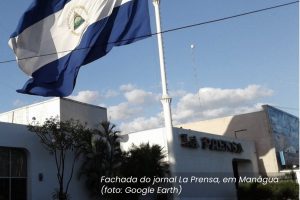Another award-winning journalist and leader of a Latin American media outlet faces judicial harassment by the government and ends up in prison, this time in Guatemala.
José Rubén Zamora, founder and head of the newspaper elPeriódico, was arrested at his home last Friday (29) and announced that he will go on a hunger strike to protest what he classifies as “conspiracy and political persecution”.
The newspaper’s newsroom was also the target of a police operation that lasted 12 hours and prohibited employees from entering and leaving.
Arrested journalist condemns corruption in Guatemala
According to prosecutors, the alleged reason for the arrest is an investigation into allegations of money laundering, racketeering and influence trading.
However, press freedom organizations say that the main reason for the arrest of the journalist was the newspaper’s critical stance against the government of Guatemalan President Alejandro Gimmattei.
In 1995, the Committee to Protect Journalists awarded Zamora the International Press Freedom Award for her work in combating censorship in Guatemala.
He was named one of the 50 Press Freedom Heroes by the International Press Institute in 2000.
elPeriódico was founded in 1996 after 36 years of civil war in the Central American country. As one of the country’s leading independent publications, it is known for exposing human rights abuses by the military and decades of corruption in the Guatemalan government.
In October, the president of elPeriódico denounced that President Giammattei and Public Department Attorney General (MP) Consuelo Porras had “adapted” a case against him to arrest him, according to the Press Association of the Americas (SIP).
The IAPA emphasizes that Zamora and the newspaper drew attention to acts of corruption by the government and the Ministry of Public Affairs.
“Several prosecutors have been sanctioned by the U.S. government, accused of persecuting anti-corruption judges and former prosecutors,” the IAPA explains.
The organization issued a statement regarding the arrest, demanding a guarantee of press freedom and legality from the government of Alejandro Giammattei.
The Committee to Protect Journalists (CPJ) has also called for the immediate release of Zamora, who has appeared in major US newspapers such as the Washington Post, New York Times and USA Today.
Guillén Kaiser, CPJ’s director in New York, pointed out that the judicial persecution of journalists is an intimidation mechanism.
“The Guatemalan authorities must end campaigns of intimidation and threats against the press,” he said.
Journalist Zamora attended a closed hearing on Saturday and was taken back to the detention center, according to a report by elPeriódico. Mariscal Zavala.
He was greeted by the fans on the way out. He said in a hoarse voice that he did not know why he was arrested.
head @el_PeriodicoJosé Rubén Zamora informs Mariscal Zavala that he has been sent and will have to attend the first declaration hearing. pic.twitter.com/TbNomMfb6b
— Rony Rios (@rrios_elP) 30 July 2022
The lawyers’ request to withdraw the arrest warrant was not accepted.
“As a small sign of protest against my arrest, which is a political accusation, I have decided to stop drinking water, coffee and food,” Zamora told reporters in a courtroom in Guatemala City. “I consider myself a political prisoner.”
A hearing is scheduled for this Monday morning (local time) (1). A vigil has been held in front of the Court of Justice, where protesters have been protesting since Saturday.
# success gallery | Citizens reach out to the Tribunales to show their support for elPeriódico.https://t.co/VrKzbanmg7
— elPeriodico (@el_Periodico) August 1, 2022
Zamora said she feared for her safety because she had “enemies in every detention centre.”
He also stated that an attack was planned against him by the detainees in the prison he was sent to in 2018.
hacked newsroom
The intimidation also affected the elPeriódico team. In the news about the incident, the newspaper stressed that although the chief prosecutor of the operation, Rafael Curruchiche, said that there was no attempt to attack journalistic work or block the newspaper, the team could always go in and out.
Rafael Curruchiche was included in the list of corrupt and anti-democratic persons in Guatemala by the United States last week. He was banned from entering the USA.
The country accuses him of hindering corruption investigations by “stopping high-level lawsuits against government officials”.
Rafael Curruchiche, head of Guatemala’s anti-impunity bureau, said in a video statement that Zamora’s arrest “had nothing to do with his activities as a journalist”.
#MPinform
Special Tax Division Prosecutor Against Impunity, licensed Rafael Curruchiche, provides information on the arrest warrant issued by a competent judge against José Rubén Zamora Marroquín. pic.twitter.com/UYCudlyMc2– MP for Guatemala (@MPguatemala) 30 July 2022
He said the newspaper’s chairman was being investigated for “a possible money laundering act in his capacity as a businessman”.
Several other top Guatemalan officials were included on the same list as Curruchiche last year, including Attorney General María Consuelo Porras, whom Zamora says was involved in the case against him, according to the Washington Post.
In May, the State Department announced additional sanctions against him for alleged “participation in significant corruption”.
Also Read | With the allegation of ‘femicide’, the judge and his daughter succeeded in censoring the newspaper that condemned nepotism in Guatemala
American lawmakers also opposed Zamora’s arrest.
Democrat James Patrick McGovern said on Twitter. “I am deeply concerned about the arrest of @ChepeZamora by the Guatemalan authorities. […] Journalism is not a crime!”
On Twitter, elPeriódico said he would not be silenced despite “constant attacks, persecution and threats against the newspaper and its president”.
“We have always believed in freedom of expression and nonetheless worked to control power through journalism,” the newspaper said.
On Sunday, the newspaper circulated with a cover stamped with the phrase No Nos Callan (Don’t silence us), which has also become a hashtag on social networks.
#NoNosCallan pic.twitter.com/vn7YkLYZ8d
— Pedro Andrés (@patercero) 31 July 2022
Latin America is experiencing a wave of repression against independent journalism through judicial harassment, and cases are being recorded in many countries.
Last week, Nicaragua’s newspaper La Prensa was forced to withdraw all professionals from the country due to increased risks of arrest, as was the case with the two drivers published on July 6.
Also Read | Nicaragua’s largest newspaper pulls entire team out of the country as it is harassed by Ortega’s government
source: Noticias
[author_name]

